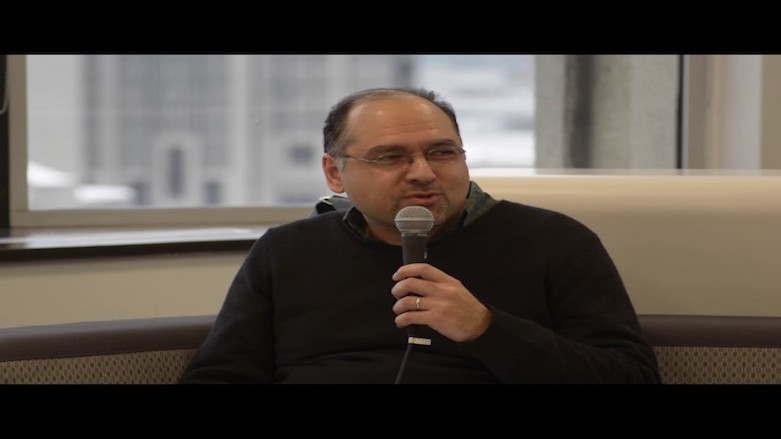Mother language-based education benefits individuals, nations: Iranian scholar

LOS ANGELES, United States (Kurdistan24) – Feb. 21 is International Mother Language Day which observes the massacre of peaceful language activists who demanded Bengali be recognized as the second official language of East Pakistan.
This request was turned into a political upheaval which eventually gave birth to an independent Bangladesh, promoting, rather than annihilating, what the mass killing was desperately trying to prevent.
Regardless of which country Kurds have found themselves in (Iran, Iraq, Turkey or Syria), their very presence has been seen as a threat.
Their physical and psychological existence have been targeted, either through genocide and fire squads, or ethnocide and linguicide.
Kurdistan24 spoke to the author of the groundbreaking book Who is Afraid of Multilingual Language Amir Kalan whose work features interviews with top scholars in the field Tove Skutnabb-Kangas, Jim Cummins, Ajit Mohanty, and Stephen Bahry.
Kalan is a researcher at the University of Toronto, Canada. His research interests include multilingual education, multiliteracies, second language writing, and multilingual text generation.
Mother tongue-based education has been the subject of heated debates, and opponents of the practice argue it would endanger the territorial integrity of the state.
However, researchers believe not only is the fear baseless, but it would inadvertently push minorities into the direction the attackers are afraid of.
“Linguistic discrimination creates strong sentiments among the oppressed that bread separatist desires,” Kalan told Kurdistan24.
“In Canada, for instance, the movement known as the ‘quiet revolution’ in Quebec—which gradually became less ‘quiet’ with growing number of acts of terrorism—lost popularity mainly because of the recognition of [French] as the second official language of Canada,” Kalan added.
Thus, research and history prove that suppressing a language would ironically contribute to feelings of exclusion which can result in demands for independence.

Moreover, opponents of multilingual education argue it is only an “academic invention,” an unrealistic academic experiment researchers have made up.
Kalan, however, argues mother language-based education is a “pedagogical need.”
“Teachers with effective pedagogical practices always consider students’ backgrounds as an important component of the process of teaching and learning. Good teaching never fails to see students’ diverse backgrounds including linguistic differences,” Kalan responded.
“Whether or not teachers are trained in ‘good’ universities, effective teachers know that they should tap into students’ linguistic backgrounds (a) for recognizing students’ identities and creating a healthy teacher-student relationship and (b) for using students’ home languages as valuable sources of knowledge,” he added.
Kalan concluded governments could ban official mother tongue-based multilingual but such decrees would “never eradicate the natural need for plurilingual pedagogies and mother tongue-based multilingual education.”
Therefore, in his book Who’s Afraid of Multilingual Education, Kalan shows that not only is mother tongue-based education not a threat, but it can also be beneficial for students and the country.
“Instruction in students’ mother tongues can help students negotiate their identities and foster a sense of belonging,” Kalan said.
“If students’ mother tongues are denied in the classroom, and if we constantly send this message to the students that their cultures are inferior, we cannot expect much in terms of student success,” he continued.
“Humiliation has never created academic growth,” Kalan added.
The researcher explained that employing mother tongue-based education would instigate a sense of belonging in students who would “feel welcome in educational settings and instead of wrestling with identity crises fully take part in the process of learning.”
He added students’ “family and community members (in particular those who don’t speak the dominant language) feel motivated to be pro-actively present in students’ educational lives and share their experiences and native knowledge with them.”
Kalan went on to explain the national benefits of supporting diversity of languages and cultures as a country’s strength, not problems.
“We will witness grassroots participation of more citizens—regardless of their backgrounds—in political and decision-making processes,” the researcher explained.
“Also, if languages are recognized, there could be enormous economic gains in culture and entertainment industries through music, literature, and performance arts,” Kalan elaborated.
“Last but not least, an attention to native languages prevents the disappearance of knowledge and philosophies that have been gained over centuries, and that can provide answers for today’s problems such as the environmental crises we are currently facing globally,” he said.
Iranian novelist Samad Behrangi is quoted in Who’s Afraid of Multilingual Education that inability to speak the dominant language causes “psychological pain” and makes students “feel defeated.”
The scholar explained the general public wrongly assumes that exposing children to the dominant language, the language of the powerful, would bring success.
“This view of language learning reduces language to a technique and language learners to an identity-less machine that can reproduce the new languages you feed them as long as you feed the machine long enough,” Kalan clarified the common misconception.
In fact, language teaching and learning include complicated forms of physiological and power relational dynamics, the Iranian teacher and PhD candidate said.
“The psychological pain Samad is talking about is a sense of indignation in response to humiliation and discrimination because of power relations between the speakers of different languages,” Kalan said.
Kalan pointed out that many who master the dominant language refuse to use it, thus manifesting resistance and expressing dignity.
Lastly, another argument opponents of mother tongue-based multilingual education use is that it is "expensive,” and publically funded schools should not bear the burden.
He explained supporting monolingual educational systems was expensive and “wasted since the philosophy behind a strictly monolingual school is often control, assimilation, and homogenization, which breed little academic success but much alienation.”
Kalan added that “the constant alienation [applied in] monolingual schools generate a large number of dropouts.”
“Although the costs might be invisible when frustrated students are pushed out of schools and wrongly labeled as ‘failures,’ societies will later pay much more…for the damages of crime, addiction, and mental health, partly created by malfunctioning educational centers,” Kalan said.
Kalan concluded by giving examples of creative ways to put together resources to support mother language education.
“Governments, for instance, can create partnerships with universities and the private sector to help with the process,” he said.
“More importantly, I believe, schools can rely on local teachers, the students themselves, and their families and communities to take the initiative and build curricula,” Kalan said.
Therefore, contrary to common belief, mother tongue-based education will prevent, and not cause, political and economic damage.
Editing by Karzan Sulaivany
